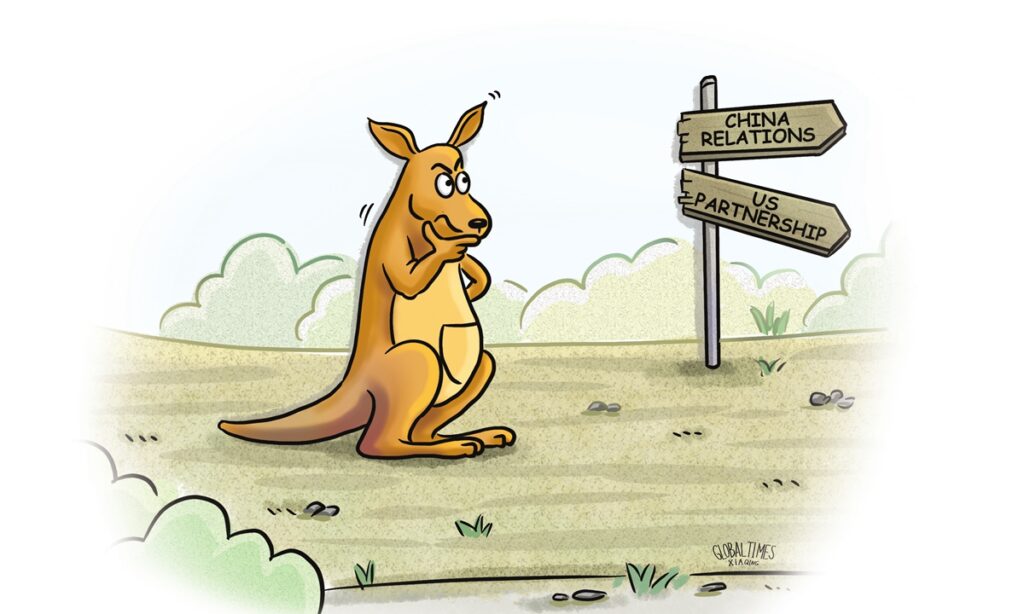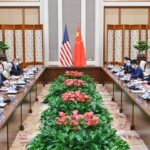The two visits in these two weeks by Australian Prime Minister Anthony Albanese, one to the seemingly close security ally the US and the other to the largest trading partner China, will be a major test for him.
Albanese visited the US before heading to China. US President Joe Biden met with Albanese at the White House on Wednesday, telling reporters he was not worried about Canberra improving relations with China. Nonetheless, he warned the Australian leader against fully trusting China. In the joint statement released by the two leaders after their meeting, the US still tried to drive a wedge between China and Australia with statements like, “we strongly oppose destabilizing actions in the South China Sea,” “we also recognize that the 2016 South China Sea Arbitral Award is final and legally binding,” “we are concerned about China’s excessive maritime claims,” and “we reaffirm the importance of maintaining peace and stability across the Taiwan Straits and our shared opposition to unilateral changes to the status quo.”
Qin Sheng, a research fellow at the Center for Australia, New Zealand and South Pacific Studies, Chinese Academy of Social Sciences, said such statements are clichés. While the US lacks fresh ideas when wooing Australia to confront China, Australia does not want to provoke China ahead of Albanese’s visit and it is unlikely that the pragmatic China policy adopted by the Albanese government will change any time soon.
“Given that Albanese linked his visit to the first visit to China by then Australian prime minister Gough Whitlam in 1973, he attaches great importance to his upcoming visit and his meetings with Chinese leaders are expected to yield positive results,” said Qin.
But Qin warns that the US will not give up its efforts to woo Australia. Biden described Australia as “an anchor to peace and prosperity” while standing alongside Albanese at the White House, to deliver his flattering of the country. In the eyes of Chen Hong, president of the Chinese Association of Australian Studies and director of the Australian Studies Center at East China Normal University, this is the sugar-coated bullet Washington shoots at Canberra.
“The US uses words of excessive praise to woo Australia and other allies and partners such as South Korea and Vietnam, because it believes that these countries could serve its strategy,” Chen told the Global Times.
The US regards Australia as its important military capability guarantee in the Indo-Pacific region. Once a military conflict breaks out, the US needs Australia as the center of its strategic outreach. The US is selfish and would rather harm its so-called closest allies such as Australia than harm itself.
Song Zhongping, a military expert and TV commentator, believes that under such circumstances, Australia can hardly become “an anchor to peace and prosperity,” but only “an anchor to war” and a strategic bridgehead for the US to contain China. While Australia avoided being involved in WWI and WWII, it risks being dragged into a conflict if it continues following US’ chariot.
It is worth noting that in the US-Australia joint statement, the two leaders announced their intention to explore trilateral cooperation with Japan on Unmanned Aerial Systems to “enhance interoperability and accelerate technology transfer in the rapidly emerging field of collaborative combat aircraft and autonomy.” Song said that the military technology cooperation among the US, Australia and Japan has already been extensive, with more of the pattern of the US selling technology and allied countries providing funds. The US aims to control the arms market of the two countries by selling them arms, and the more shares the US has in their arms market, the more control the US holds over the two countries.
Meanwhile, Chen told the Global Times that unmanned aerial systems are effective combat weapons in modern warfare. Australia has neither the technology nor the funds to develop such systems, and it can only play the role of a testing ground due to its vast geographical area. It is also possible that unmanned aerial vehicles would take off from Australia in future military operations. “This actually brings security risks to Australia,” said Chen.
For the US, allies are to be exploited. Once they cannot help protect US interests, they will be abandoned like worn-out shoes by the US and their interests will not come to US’ mind even for a second. Hopefully, Albanese can realize that normal China-Australia relations serve his country’s interests. China is an irreplaceable market for Australia, and the US will not make up for the Chinese market Australia might lose due to worsened relations with China. Australia should have a clear understanding of the significance of its relations with China and avoid being hijacked by the US to maximize its interests.
(Global Times)




